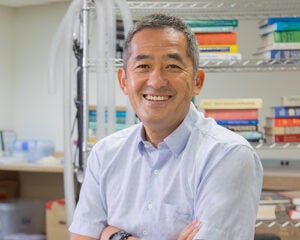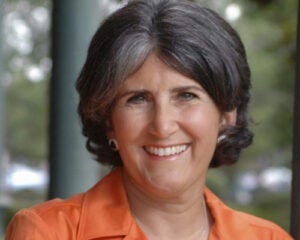To bridge health disparities, increase accessibility to information and address the dangers of diabetes in highly impacted populations, researchers at the College of Education (COE) are taking an innovative approach — they are going to church.
For half a decade, COE researchers working with TX STRIDE (Strength Through Resilience in Diabetes Education), a program funded by the National Institutes of Health, have taken a culturally tailored, resilience-based approach to diabetes self-management education for African American adults with Type 2 diabetes across 27 churches in the Austin area.
According to researcher Dr. Hirofumi Tanaka, a professor in COE’s Department of Kinesiology and Health Education and holder of the Ruth Knight Millikan Centennial Professorship, the concept is similar to other research attempts in which health screenings were held in barber shops to access African American men who would not regularly visit a doctor.

If you look at New Year’s resolutions, about 50% of people stop exercising after three months,
Dr. Tanaka said. Exercise is a form of stress, and it is not easy to
continue. But if you think about a religion, like Christianity, that is a lifetime commitment. So, if you combine lifestyle changes with a religious aspect, this is a perfect combination.
Resilience is the ability to adapt to adversity and handle stress effectively. Researchers are now examining their premise that adding a resilience component to a self-management training curriculum can lead to more effective management of a chronic stressor like diabetes.
Diabetes is not like the common cold where you can get over it,
said Dr. Mary Steinhardt, a professor in the Department of Kinesiology and Health Education who leads the TX STRIDE research. Once you get diagnosed with diabetes, you have diabetes for a lifetime, but you can manage it very effectively.
The program, which consisted of 18 meetings for participants that included eight weekly classes, eight support group sessions and two booster sessions, began before the COVID-19 pandemic. Dr. Steinhardt said she would go out to churches and make an announcement during the service about the program. Often, her research team would offer free blood glucose screenings after church and then invite people to sign up.
When the pandemic began in 2020, the program was paused for eight months before resuming virtually via Zoom. She said the virtual component ended up helping with attendance, which in the end was 90% for all 18 sessions, as it was difficult for many participants who lived in the city’s outskirts to commute to downtown Austin churches for weekly in-person sessions.
According to Dr. Steinhardt, the program was received well and focused on infusing resilience skills into diabetes self-management education by reframing how participants view the disease and its impact on their lives. One example, she said, is analyzing the positive impacts diabetes has had on your life, such as becoming more active and seeking healthy food alternatives or sharing healthier dishes with friends and family.

We look to find positive meaning in things,
Dr. Steinhardt said. We encourage participants to notice the impact of negative thoughts on their diabetes management and mental health.
To help participants change an unhelpful thought, the program uses the phrase ‘catch it, challenge it, change it’ and asks participants to examine if their thoughts are helpful or harmful and how they would advise a friend in a similar situation.
The premise of the grant is that the data will show that integrating a resilience component in diabetes self-management education can help lower glucose levels and maintain them over time. To examine this premise, the grant follows participants at each church for two years.
For Dr. Steinhardt, who also serves as UT Austin’s Research Integrity Officer, the topic of learning to manage the disease through healthy habits hits close to home as she said many members of her family suffered from diabetes, including her father who had below-the-knee amputations on both legs due to complications from diabetes.
We just didn’t have the education,
Dr. Steinhardt said. We are from a very small town, whereas if I were diagnosed today, I feel like I have the education to control the disease for a lifetime.
As this trial comes to an end in the Spring of 2025, data collected is already gleaming helpful insights, including the association between consumption of ultra-processed foods and high glucose levels.
Working with colleagues from nutritional sciences, TX STRIDE examined the daily eating habits of participants to understand the impact of their diet on HbA1c, a blood indicator that measures average glucose in recent months. Although the team found that blood glucose levels were not related to several diet quality scores, the consumption of ultra-processed foods such as canned, boxed and pre-packaged food was related to higher HbA1c.
If you think about it, this finding makes sense,
Dr. Steinhardt said. Participants get it and encourage each other to shop around the perimeter of the grocery store for fresh fruits, vegetables, meats and dairy, and choose fewer boxed or packaged items.
Another program strategy — everyone’s favorite — is the Hook ‘Em hand signals to help participants remember the number of carbohydrate servings per meal. Instructors put up both hands with Hook ‘Em Horns as a reminder that participants need about four carbohydrate servings at each meal to fuel their bodies. According to Dr. Steinhardt, just like our cars need gasoline for fuel, our bodies need carbohydrates, but too many can damage our bodies.
Now, as they come up on six years of the grant, Dr. Steinhardt and the TX STRIDE team are preparing a celebration with all of the participants.
The team plans to give participants a copy of the six published papers associated with the project thus far and provide the entire diabetes curriculum to the churches so they can make it available on their website to continue educating parishioners.
We will continue reminding people that we are not the food police,
Steinhardt said. The TX STRIDE program is about fueling our bodies and enjoying food rather than perpetuating the restrict-binge-guilt cycle.

